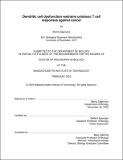Dendritic cell dysfunction restrains cytotoxic T cell responses against cancer
Author(s)
Zagorulya, Maria
DownloadThesis PDF (20.22Mb)
Advisor
Spranger, Stefani
Terms of use
Metadata
Show full item recordAbstract
Although immune checkpoint blockade (ICB) therapy can induce durable survival benefits in patients with advanced cancer, most patients do not respond. ICB acts by reinvigorating pre-existing anti-tumor immune responses, and responders are often characterized by the presence of a T cell infiltrate in tumors. However, T cell infiltration does not always correspond to ICB efficacy. Tumor-reactive T cells can acquire persistent dysfunctional states, which are resistant to ICB reinvigoration. Increasing evidence suggests that T cell dysfunction can arise during T cell priming. Dendritic cells (DCs) play a key role in priming tumor-reactive T cells, indicating that DC-derived signals could regulate the functional quality of anti-tumor T cell responses. In this work, we investigated how cancer-associated suppression of DCs could lead to dysfunctional anti-tumor T cell responses.
First, we explored tissue-specific mechanisms that could mediate lung tumor-specific T cell dysfunction, previously found to be induced during T cell priming in the lung tumor-draining lymph node (tdLN). We determined that the T cell dysfunction was caused by regulatory T cell (Treg)-mediated suppression of DC stimulatory capacity. Suppression required direct contact between Tregs and DCs and was specifically associated with the presence of clonally-expanded T helper type 1 (TH1)-like Tregs. TH1-like Tregs were induced in response to elevated levels of interferon-gamma (IFNγ) in the lung tdLN. Administration of IFNγ-blocking antibody could counter the tissue-specific enrichment in IFNγ, repolarize Tregs and restore cytotoxic T cell responses against lung cancer.
Next, we examined longitudinal changes in anti-tumor immunity associated with the observed decline in ICB efficacy in later-stages tumors. We found that ICB resistance at later timepoints was accompanied by T cell dysfunction and a decline in stimulatory DCs in both the tumor and tdLN. Treatment with Poly(I:C) could enhance T cell and DC responses at later timepoints, providing a clear rationale for combination immunotherapy using Poly(I:C) and ICB.
Our work demonstrates that distinct tissue-specific and temporal elements can suppress DC ability to support productive anti-tumor immunity. Counteracting these mechanisms of DC dysfunction has the potential to enhance cytotoxic T cell responses and help better leverage the potential of anti-tumor immunity for long-term disease control.
Date issued
2023-02Department
Massachusetts Institute of Technology. Department of BiologyPublisher
Massachusetts Institute of Technology